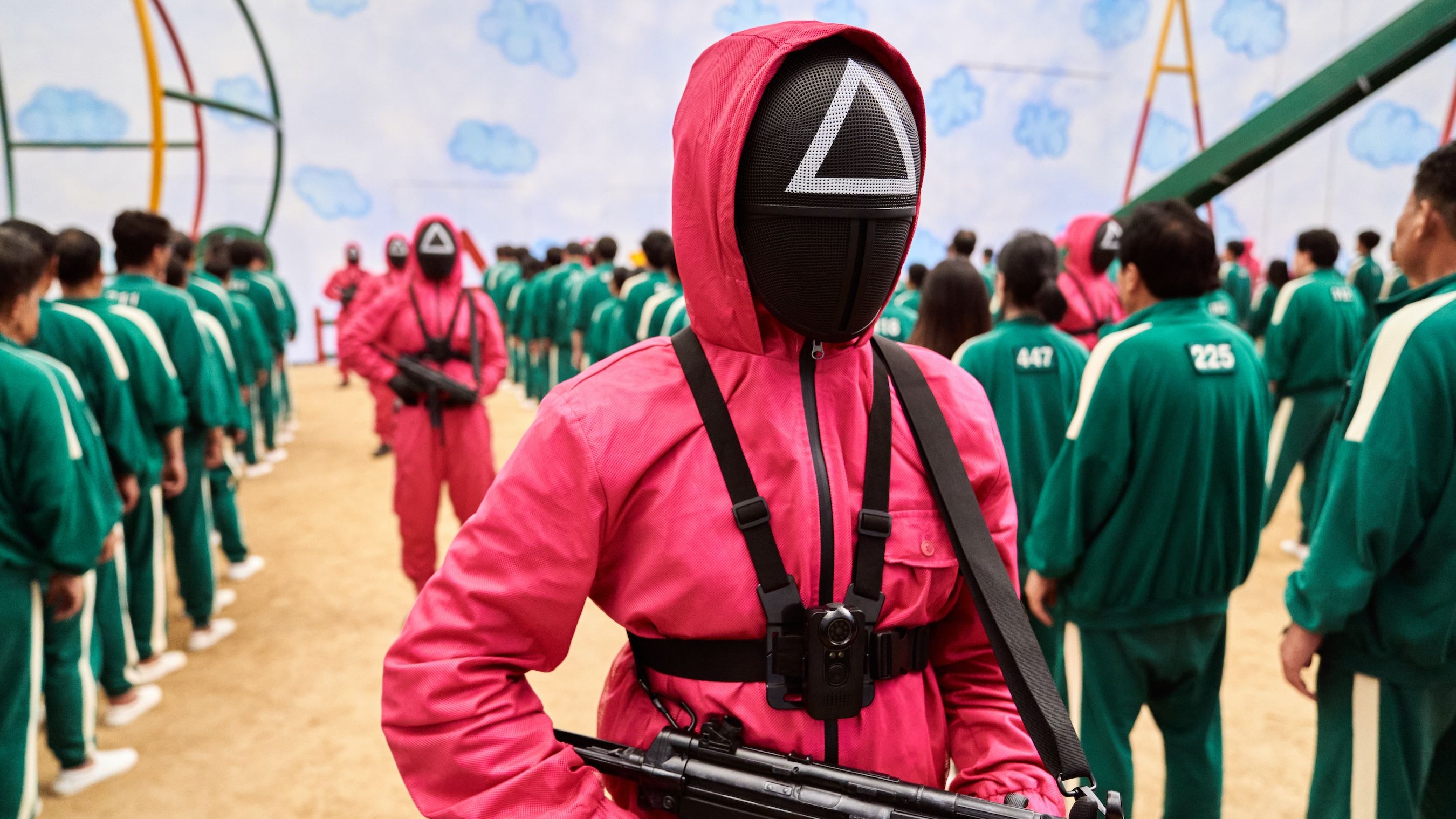
Sign up for breaking news, reviews, opinion, top tech deals, and more.
You are now subscribed
Your newsletter sign-up was successful
When Netflix co-CEO Ted Sarandos told reporters that “the Squid Game universe has just begun” earlier this year, he wasn’t kidding.
Just days after the streamer officially confirmed the development of Squid Game season 2, Netflix has announced plans to launch “the biggest reality competition series ever” in the form of Squid Game: The Challenge – a 10-episode game show that will see 456 contestants battling it out for an almighty $4.56 million cash prize.
“As they compete through a series of games inspired by the original show – plus surprising new additions – [contestants’] strategies, alliances, and character will be put to the test while competitors are eliminated around them,” Netflix wrote in a statement announcing the series.
Squid Game: The Challenge is recruiting for participants now – you can apply yourself here if you’re feeling brave – and the show is expected to begin shooting in the UK for up to 4 weeks in early 2023. By that schedule, the series could hit Netflix as soon as the second half of next year.
But let’s not beat about the bush: this announcement comes as no surprise. Squid Game was nothing short of a cultural phenomenon for Netflix in 2021, racking up an unprecedented number of viewing hours to become the biggest show in the streamer’s history (not even Stranger Things season 4 could vault the bar set by Hwang Dong-hyuk's dystopian survival drama).
Future seasons of Squid Game were all-but assured following the conclusion of its nine-episode debut, and the series’ unique game show-style premise led many to believe that a Squid Game-inspired Netflix reality production was also a formality.
Now, that reality series is, well, a reality – and despite the inevitable nature of the whole concept, Squid Game: The Challenge nonetheless represents a stroke of genius on the part of a streamer whose recent subscriber woes have left it clamouring for new long-term successes.
Sign up for breaking news, reviews, opinion, top tech deals, and more.
Raising the bar for reality TV
Netflix has doubled down on producing a conveyor belt of reality-style shows in recent years, with mixed results.
On the one hand, the relentless addition of series in the Sexy Beasts and Is It Cake? mold suggests the company’s annual $14 billion content budget no longer provides the quality assurance subscribers once thought it did. To make matters worse, these overproduced game shows seem less likely to face the chopping block than many of the genuinely genre-pushing projects that Netflix occasionally strikes gold with (the likes of Archive 81, Sense8 and The OA have all fallen victim to its now-infamous cancel culture in recent years).

But for all the triviality of Sexy Beasts, the likes of The Circle, Selling Sunset, Too Hot to Handle and Love Is Blind have proven the streamer’s ability to produce genuinely enjoyable reality shows with dedicated fan bases (many of these multi-season series regularly pop up among Netflix's weekly most popular rankings, too). None, though, are treated with the same marketing oomph nor enjoy anything close to the mainstream popularity of the platform's tentpole shows – and their romance-based premises are to blame.
The Squid Game universe, in contrast, evidently appeals to all types of audiences. There is no question that millions of new and existing subscribers would tune in to watch 456 members of the public running, jumping and cookie-cutting their way through a string of familiar challenges (YouTube star MrBeast was quick to produce his own unofficial, and wildly popular, Squid Game competition following the release of the Netflix series last year).
Heck, Squid Game: The Challenge might prove even more entertaining than its fictional counterpart. What’s more, unlike its source material, the series won’t be bound by narrative logic – meaning it could, in theory, run for as long as viewers remain interested.
Consider the enduring popularity of Love Island, for instance, which remains the benchmark for reality TV in 2022. The UK-produced matchmaking series kicked off way back in 2015 and, seven seasons later, its annual format remains unchanged.
Squid Game: The Challenge, by its nature, could conceivably offer audiences more variety than Love Island by switching up its games year-on-year – but the point is, it probably won’t need to.

Of course, such a large-scale production will present its own unique challenges for Netflix. There’s no knowing which of Squid Game: The Challenge’s 456 contestants will make it past which challenges, meaning producers may find it tricky to focus coverage on certain individuals. The audience, therefore, might struggle to form any meaningful connections with participants (why should they care about contestant number 321, for example, over contestant number 14?).
Likewise, given that (we think?) the consequences of failing a challenge won’t mean certain death, it may be difficult for Netflix to develop any meaningful stakes in a show so singularly reliant on the allure of its grand prize (although, in fairness, the majority of the world’s game shows revolve around money).
But these are all bridges Netflix will hope to cross when it comes to them. For now, Squid Game: The Challenge seems like a sure-fire phenomenon and, should it get anywhere close to reaching its mammoth potential, it could lay the groundwork for a slew of IP-based Netflix reality series in the future.
Bridgerton: The Dating Experience? Money Heist: The Break-In? Judging by the number of Netflix-inspired live events and Halloween costumes every year, fans are ready and willing to immerse themselves in the streamer’s fictional worlds.
Look out, Love Island: The Front Man is coming.

Axel is TechRadar's Phones Editor, reporting on everything from the latest Apple developments to newest AI breakthroughs as part of the site's Mobile Computing vertical. Having previously written for publications including Esquire and FourFourTwo, Axel is well-versed in the applications of technology beyond the desktop, and his coverage extends from general reporting and analysis to in-depth interviews and opinion.
Axel studied for a degree in English Literature at the University of Warwick before joining TechRadar in 2020, where he earned an NCTJ qualification as part of the company’s inaugural digital training scheme.
